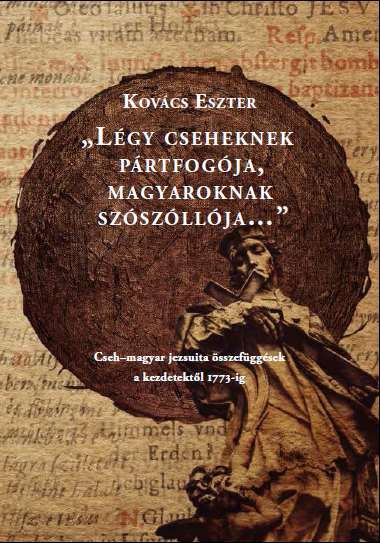
Double book launch
On November 19, 2015, National Széchényi Library and the Institute of History of the Faculty of Humanities and Social Sciences at Pázmány Péter Catholic University will hold a double book launch at 4.30 p.m., in the Ceremonial Hall on Floor 6 of the Library.
Volumes to be presented:
 The book by Eszter Kovács entitled ”Become a patron of Czechs, an advocate of Hungarians…” Czech-Hungarian Jesuit relationships from the beginnings until 1773. (Budapest, FHSS PPCU – NSZL, 2015. [Művelődéstörténeti Műhely (Cultural History Workshop), Monographs 2.] 357 pages) discusses a little known detail of the history of Czech-Hungarian relations. Studying the cultural history of 17th- to 18th-century Hungary, we find regular signs referring to Czech influence. Geographical proximity, kin relationships between noble families and the common king all contributed to the growth of Czech-Hungarian relations, one of the major factors being activities carried out by church intellectuals. In case of the Protestant denominations, an iconic example is the wave of refugees following the Battle of Fehérhegy. Culture mediated by them was zealously received by the local Slovaks, since they understood the language used by the refugees. What is more, as of the early 17th century, they themselves used the so-called biblical Czech language as a literary language. From the Catholic side, no volume migration took place. At the same time, 18th-century Catholic culture showed regular signs of Czech influence. Bohemian saints were popular and Catholic printing houses published a great number of books of Bohemian origin. This raises the question who might have been the mediators, whether there had been a Czech Catholic intelligentsia in Hungary, and what kind of influence they had on the Hungarian culture.
The book by Eszter Kovács entitled ”Become a patron of Czechs, an advocate of Hungarians…” Czech-Hungarian Jesuit relationships from the beginnings until 1773. (Budapest, FHSS PPCU – NSZL, 2015. [Művelődéstörténeti Műhely (Cultural History Workshop), Monographs 2.] 357 pages) discusses a little known detail of the history of Czech-Hungarian relations. Studying the cultural history of 17th- to 18th-century Hungary, we find regular signs referring to Czech influence. Geographical proximity, kin relationships between noble families and the common king all contributed to the growth of Czech-Hungarian relations, one of the major factors being activities carried out by church intellectuals. In case of the Protestant denominations, an iconic example is the wave of refugees following the Battle of Fehérhegy. Culture mediated by them was zealously received by the local Slovaks, since they understood the language used by the refugees. What is more, as of the early 17th century, they themselves used the so-called biblical Czech language as a literary language. From the Catholic side, no volume migration took place. At the same time, 18th-century Catholic culture showed regular signs of Czech influence. Bohemian saints were popular and Catholic printing houses published a great number of books of Bohemian origin. This raises the question who might have been the mediators, whether there had been a Czech Catholic intelligentsia in Hungary, and what kind of influence they had on the Hungarian culture.
Research into Czech-Hungarian relations goes way back in time, but so far no one has tried to explore the system of 16th- to 18th-century Catholic relations. Especially interesting is the way the Jesuits operated. The exploration of the Czech-Hungarian Jesuit interaction is essential to getting to know the cultural history of 16th- to 18th-century Hungary. The volume, which was published jointly by the Institute of History of the Faculty of Humanities and Social Sciences at Pázmány Péter Catholic University and National Széchényi Library, gives an insight into a niche of this rich system of relations.
 The book edited by Anita Bojtos and entitled Eastern Christian Culture within and outside Our Borders (Budapest – Piliscsaba, FHSS PPCU – Ifjúsági Koordinációs Központ Egyesület (Youth Coordination Centre Association), 2015. [Művelődéstörténeti Műhely (Cultural History Workshop), Order Historical Conferences 9.] 192 pages) includes the studies of the jubilee conference held on November 9, 2012 at Pázmány Péter Catholic University. The conference was held to commemorate the 100th anniversary of the foundation of Hajdúdorog Diocese. The current volume contains not only the studies of the 2012 lecturers but also other, thematically related pieces. We are hoping to commemorate the jubilee conference as well as to make our contribution to the spreading and better knowledge of Eastern Christian (Greek Catholic, Armenian or orthodox) culture.
The book edited by Anita Bojtos and entitled Eastern Christian Culture within and outside Our Borders (Budapest – Piliscsaba, FHSS PPCU – Ifjúsági Koordinációs Központ Egyesület (Youth Coordination Centre Association), 2015. [Művelődéstörténeti Műhely (Cultural History Workshop), Order Historical Conferences 9.] 192 pages) includes the studies of the jubilee conference held on November 9, 2012 at Pázmány Péter Catholic University. The conference was held to commemorate the 100th anniversary of the foundation of Hajdúdorog Diocese. The current volume contains not only the studies of the 2012 lecturers but also other, thematically related pieces. We are hoping to commemorate the jubilee conference as well as to make our contribution to the spreading and better knowledge of Eastern Christian (Greek Catholic, Armenian or orthodox) culture.
Welcome speeches will be delivered by:
- Prof. Dr. Judit P. Vásárhelyi, literary historian (National Széchényi Library – FHSS of Pázmány Péter Catholic University)
- Dr. Sándor Jaczkó, Vicar of Greek Catholic Metropoly
The book by Eszter Kovács will be presented by Dr. István Käfer, honorary associate professor at Gál Ferenc College and Dr. Csaba Szilágyi, Dean of the Faculty of Humanities and Social Sciences at Pázmány Péter Catholic University, while the book by Anita Bojtos will be presented by Dr. István Baán, Greek Catholic church historian.



